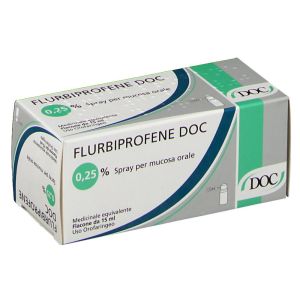Ship in Europe, Find out rates!
Flurbiprofen Doc Oral Spray 0.25% 15 ml

- box Delivery in Italy in 24/48 and free returns
- star3.000+ positive reviews
- dropboxOver 60,000 products in the catalog
Therapeutic indications
Symptomatic treatment of irritative-inflammatory states also associated with oropharyngeal pain (eg gingivitis, stomatitis, pharyngitis), also as a consequence of conservative or extractive dental therapy.
Dosage
Undesirable effects can be minimized by using the lowest effective dose for the shortest possible duration of treatment needed to control symptoms (see section 4.4). Mouthwash : The recommended dose is two or three rinses or gargles a day with 10ml of mouthwash. It can be diluted in water. Oromucosal spray : the recommended dose is 2 sprays 3 times a day addressed directly to the affected area.
Overdose
Symptoms Symptoms of overdose may include nausea, vomiting and gastrointestinal irritation. Treatment Treatment should include gastric lavage and, if necessary, correction of the serum electrolyte picture. There is no specific antidote for flurbiprofen.
Contraindications
Hypersensitivity to the active substance or to any of the excipients. Flurbiprofen is contraindicated in patients with known hypersensitivity (asthma, urticaria or allergic type) to flurbiprofen or to any of the excipients, and to aspirin or other NSAIDs. Flurbiprofen is also contraindicated in patients with a history of gastrointestinal bleeding or perforation related to previous NSAID treatment. Flurbiprofen should not be taken by patients with active or anamnestic ulcerative colitis, Crohn's disease, recurrent peptic ulcer or gastrointestinal bleeding (defined as two or more distinct episodes of proven ulceration or bleeding). Flurbiprofen is contraindicated in patients with severe heart failure. Third trimester of pregnancy
Side effects
The following undesirable effects have been reported, particularly after administration of formulations for systemic use: Blood and lymphatic system disorders Thrombocytopenia, aplastic anemia and agranulocytosis. Immune system disorders Anaphylaxis, angioedema, allergic reaction. Psychiatric Disorders Depression. Nervous system disorders Dizziness , cerebrovascular accidents, visual disturbances, optic neuritis, migraine, paraesthesia, depression, confusion, hallucination, dizziness, malaise, fatigue and somnolence. Acoustic and labyrinth disorders Tinnitus. Cardiovascular disorders Edema, hypertension and heart failure. Clinical studies and epidemiological data suggest that the intake of some NSAIDs (especially at high doses and in the case of long-term treatment) may be associated with an increased risk of arterial thrombotic events (e.g. myocardial infarction or stroke). Respiratory, thoracic and mediastinal disorders Reactivity of the respiratory tract (asthma, bronchospasm and dyspnoea). Gastrointestinal disorders The most commonly observed adverse events are gastrointestinal in nature. Nausea, vomiting, diarrhea, flatulence, constipation, dyspepsia, abdominal pain, melaena, haematemesis, ulcerative stomatitis, gastrointestinal haemorrhage and exacerbation of colitis and Crohn's disease have been reported following administration of flurbiprofen (see Contraindications section). Gastritis, peptic ulcer, perforation and ulcer haemorrhage were observed less frequently. Local irritation can occur with suppositories. Cases of pancreatitis have been reported very rarely. Skin and subcutaneous tissue disorders Skin disorders including rash, pruritus, urticaria, purpura, angioedema and very rarely bullous dermatosis (including Stevens-Johnson syndrome, toxic epidermal necrolysis and erythema multiforme). During clinical trials with flurbiprofen patches, the most commonly reported adverse reactions were local skin reactions (including redness, rash, itching, rash, numbness and tingling); however the incidence was low (4.6%). Renal and urinary tract disorders Nephrotoxicity in various forms, including interstitial nephritis and nephrotic syndrome. As with other NSAIDs, rare cases of renal failure have been reported.
Pregnancy and breastfeeding
Pregnancy Inhibition of prostaglandin synthesis may adversely affect pregnancy and / or embryo / fetal development. Results of epidemiological studies suggest an increased risk of miscarriage and cardiac malformation and gastroschisis after use of a prostaglandin synthesis inhibitor in early pregnancy. The absolute risk of cardiac malformations increased from less than 1% to approximately 1.5%. The risk was considered to increase with dose and duration of therapy. In animals, administration of prostaglandin synthesis inhibitors has been shown to cause an increase in pre- and post-implantation loss and embryo-fetal mortality. In addition, an increased incidence of various malformations, including cardiovascular, has been reported in animals given prostaglandin synthesis inhibitors during the organogenetic period. During the first and second trimester of pregnancy, flurbiprofen should not be administered except in strictly necessary cases. If flurbiprofen is used by a woman attempting to conceive or during the first and second trimester of pregnancy, the dose and duration of treatment should be kept as low as possible. During the third trimester of pregnancy, all prostaglandin synthesis inhibitors can expose the fetus to: • cardiopulmonary toxicity (with premature closure of the arterial duct and pulmonary hypertension); • renal dysfunction, which can progress to renal failure with oligo-hydroamnios; the mother and the newborn, at the end of pregnancy, to: • possible prolongation of the bleeding time, an antiplatelet effect which can occur even at very low doses; • inhibition of uterine contractions resulting in delayed or prolonged labor. Consequently flurbiprofen is contraindicated during the third trimester of pregnancy. Breastfeeding Flurbiprofen is excreted in breast milk; however the amount excreted is only a small fraction of the maternal dose. Administration of flurbiprofen is not recommended in nursing mothers.
Special warnings
At the recommended doses, the possible swallowing of FLURBIPROFENE DOC 0.25% Mouthwash and FLURBIPROFENE DOC 0.25% Spray for oral mucosa does not cause any harm to the patient as these doses are much lower than those of the single dosage of the product by route. systemic. During the first and second trimester of pregnancy, flurbiprofen should not be administered except in strictly necessary cases. Administration of flurbiprofen is not recommended in nursing mothers. The use of FLURBIPROFENE DOC 0.25% Mouthwash and FLURBIPROFENE DOC 0.25% Spray for oral mucosa, especially if prolonged, can give rise to sensitization or local irritation; in such cases it is necessary to interrupt the treatment and consult the doctor to establish, if necessary, a suitable therapy. Do not use for prolonged treatments. After short periods of treatment without appreciable results, consult your doctor. Important information about some of the ingredients Mouthwash and oral mucosal spray contain para-hydroxybenzoates which can cause allergic reactions (including delayed). Patent V blue dye (E131) can cause allergic reactions. Polyoxyethylenated 40-hydrogenated castor oil can cause localized skin reactions. Both the mouthwash and the spray contain a small amount of ethyl alcohol, less than 100 mg per dose.
Expiry and Retention
None.
Active principles
FLURBIPROFENE DOC 0.25% Mouthwash 100 ml of solution contain: Active ingredient: flurbiprofen 0.25 g. FLURBIPROFENE DOC 0.25% Spray for oral mucosa 100 ml of solution contain: Active ingredient: flurbiprofen 0.25 g. Excipients : ethanol 8.64 g methyl p-hydroxybenzoate 0.10 g propyl p-hydroxybenzoate 0.02 g hydrogenated castor oil-40 polyoxyethylenate 2.00 g patent blue dye V (E131) 0.0006 g For the complete list excipients, see section 6.1.
Excipients
FLURBIPROFENE DOC 0.25% Mouthwash and FLURBIPROFENE DOC 0.25% Oral mucosal spray Glycerol (98%), ethanol, non-crystallizable liquid sorbitol, hydrogenated castor oil-40 polyoxyethylenate, sodium saccharin, methyl parahydroxybenzoate, propyl parahydroxybenzoate, mint flavor , patent blue V (E131), anhydrous citric acid, sodium hydroxide, purified water.
| Destination | Cost | Detail |
|---|---|---|
| Italy | €5,00* | 72H |
| Austria, France, Germany, Slovenia | € 13* | 3 days |
| Belgium, Luxembourg, Portugal, Netherlands, Spain | € 14* | 4 days |
| Bulgary, Cechia, Hungary, Poland, Romania, Slovakia | € 19* | 5 days |
| Denmark, Estonia, Finland, Ireland, Lithuania, Latvia ,Sweden | € 22* | 5 days |
| United Kingdom, Switzerland, Greece, Malta/td> | € 30* | 7 days |
| Canada | € 40 | 7 Days |
European shipments with express courier: FedEx, MBE, DHL
*For the shipment outside band B ther's an extra cost of 22€ *For the shipment outside band C ther's an extra cost of 30€ Delivery Times exclude Saturday and Holidays
For Islands and Areas of difficult Accessibility the shipments are made in 72 hours and the cost will be increased by 15€

